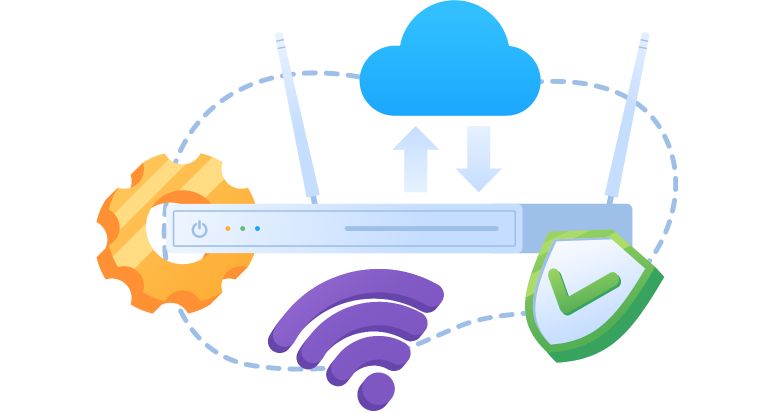Are you worried about keeping your information safe in the cloud? Cloud computing network security is here to shield your data from cyber-attacks.
This guide will explore strategies and best practices for enhancing cloud security and protecting your network.
Keep reading to learn how!
Importance of Cloud Network Security
Cloud network security is vital for ensuring better data protection and enhanced visibility for administrators. It simplifies policy management, automates threat analysis, and neutralizes malicious attacks.
Better data security
Better data security in cloud computing means keeping user data safe from cyber-attacks and preventing any unauthorized changes or deletions. This protection comes from a combination of strong encryption methods, secure access controls, and the use of multi-factor authentication.
Through these measures, sensitive information remains protected whether it’s stored on public, private, or hybrid cloud networks.

Implementing robust cybersecurity practices such as regular security audits ensures that the defenses stay updated against potential threats. These strategies help minimize the risk of malicious actors gaining access to important data.
By focusing on enhancing cybersecurity and employing best practices like password management and threat detection, businesses can safeguard their network infrastructure within the cloud architecture effectively.
Enhanced visibility for administrators
Cloud network security provides enhanced visibility for administrators through robust network monitoring tools. These tools enable real-time tracking and analysis of network traffic, allowing administrators to promptly identify any irregular activities or potential security breaches.
By leveraging specialized security protocols and intrusion detection systems, cloud network security equips administrators with the information needed to maintain a secure environment proactively.
Moreover, the implementation of virtual private networks (VPNs) enables encrypted communication channels, further enhancing the ability of administrators to oversee and safeguard network operations effectively.
In addition to this, best practices for cloud network security emphasize regular security audits as crucial in ensuring that all areas are meticulously examined for vulnerabilities.
Implementing strong authentication measures like data encryption and firewall protection adds an extra layer of defense against unauthorized access attempts. This comprehensive visibility empowers administrators with actionable insights into potential threats and helps them maintain a highly secure cloud network environment.
Simplified policy management
Cloud network security offers simplified policy management, allowing administrators to efficiently regulate access and permissions. With the use of robust technology and controls, policies can be easily configured and enforced across cloud networks.
Implementing strong authentication and encryption as best practices ensures that policy management is aligned with information security requirements in cloud computing.
This streamlined approach enhances data protection while minimizing complexities in managing network security policies, ultimately safeguarding against unauthorized access and potential cyber threats.
Threat analysis and neutralization
Cloud network security involves thorough threat analysis and neutralization to safeguard against cyber-attacks. This process encompasses identifying potential threats, such as malware or unauthorized access, and implementing strategies to neutralize them effectively.
Network administrators utilize advanced tools and technologies, including intrusion detection systems and real-time monitoring, to proactively identify and counter potential threats.
Additionally, the implementation of virtual private networks (VPNs) enhances data encryption for secure information transmission within cloud networks, further strengthening threat neutralization measures in cloud computing security.
In cloud computing security, threat analysis plays a crucial role in identifying vulnerabilities and formulating preemptive measures against potential cyber threats. Neutralizing these risks requires vigilant monitoring of network activities alongside proactive measures such as regular security audits and penetration testing.
By leveraging comprehensive threat analysis tools coupled with robust neutralization techniques like encryption protocols and access control mechanisms, organizations can fortify their cloud network security posture against evolving cyber threats effectively.
Security automation
Security automation in cloud network security involves using technology to handle security tasks, such as monitoring for unusual activity and responding to threats, without the need for manual intervention.
Automation tools can efficiently manage routine security measures, like implementing updates and patches, enabling quick responses to potential risks in virtual private networks (VPNs), thereby enhancing overall protection.
For instance, automated systems can swiftly implement predefined security protocols within network architecture, allowing for timely threat analysis and neutralization. This proactive approach not only ensures better data security but also streamlines policy management while providing enhanced visibility for administrators into potential vulnerabilities.
By incorporating automation tools within cloud network security strategies, organizations can effectively shield against cyber-attacks and bolster their overall digital safety.
Challenges and Solutions for Cloud Network Security
Cloud network security faces challenges such as data breaches, unauthorized access, and compliance issues. Solutions include implementing strong authentication methods like Virtual Private Network (VPN) and multi-factor authentication.

Encryption techniques also play a crucial role in securing data on cloud networks, ensuring that sensitive information remains protected from potential threats.
Moreover, regular security audits are vital to identify vulnerabilities and ensure that the cloud network is fortified against evolving cyber threats. It is essential for businesses and individuals utilizing cloud computing services to understand these challenges and implement effective solutions to safeguard their data effectively.
Conclusion
Explore the essential aspects of network security in cloud computing, including its significance, challenges, and solutions. Learn about the best practices for maintaining digital safety and protecting sensitive information.
Discover the top 5 crucial network security tips for cloud computing to address security issues effectively. Understanding cloud network security is vital for businesses and individuals utilizing cloud computing services to ensure data protection and privacy.
See Also: Mastering Magento 2 Collection Filtering: Enhance Your ECommerce Experience










